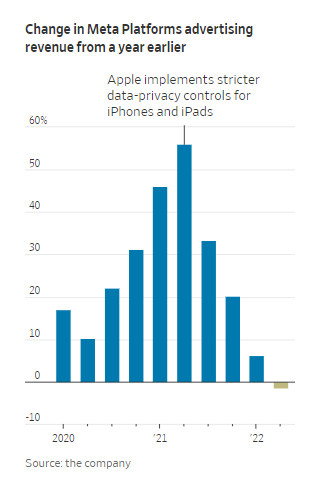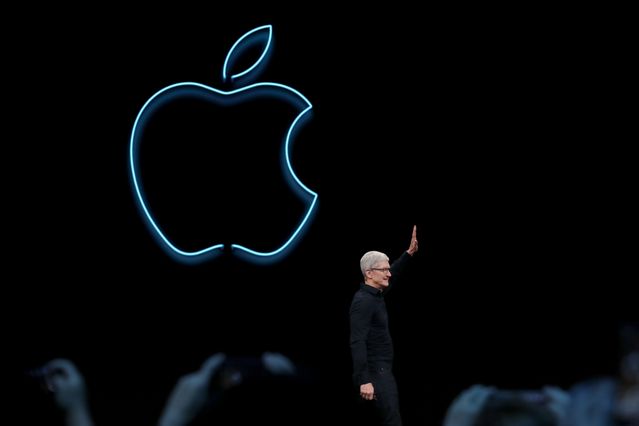The battle between Apple and Facebook over privacy policies is shaking up the digital economy, forcing numerous companies to redirect billions of USD in advertising revenue and limit user information to advertisers.
In 2021, Apple fired the first shot by launching the iOS 14.5 operating system, a version that allows iPhone and iPad users to easily block ads from Facebook. Specifically, Apple introduced a feature that manages how third-party applications like Facebook collect user data.
This move by Apple caused Facebook to lose billions of USD in revenue and created unprecedented tension between the two tech giants.

However, there is a little-known fact that before the war began, Apple had proposed sharing the enormous advertising revenue from Facebook but was refused, which is the main reason why the tech giant decided to strike first.
The ‘Symbiosis’ Proposal
According to the Wall Street Journal (WSJ), Apple had proposed a deal to share a portion of advertising revenue from Facebook years before taking action. WSJ’s sources indicate that Apple “sought to build a business alliance with Facebook”.
One of the proposed options was to create an ad-free version of Facebook. Since Apple charges fees on their app store, an ad-free version of Facebook that incurs a purchase cost on the App Store could benefit both parties.
Additionally, Apple wanted to get into the boosted post service, where customers pay Facebook to increase the visibility of their ad posts.
WSJ’s sources reported that Apple suggested Facebook turn this service into a type of application so that the tech giant could take a 30% cut from the revenue. This is rare as Apple typically does not share revenue from advertising activities.
These demands from Apple were not accepted by Facebook as the social network did not want to share its lucrative revenue. In fact, CEO Mark Zuckerberg postponed data updates to avoid affecting advertising business growth.
Ultimately, Apple had to take a hard stance in 2021 by launching the App Tracking Transparency (ATT) feature that helps users manage data collection.
According to a survey by Insider Intelligence, only about 37% of iPhone and iPad users allowed third parties to collect data and track them, causing a seismic shift in advertising. A report from Tenjin and Growth FullStack in June 2022 showed that 59% of mobile advertising budgets in the UK and the US had shifted from Apple’s iOS to Google’s Android.
Meanwhile, Lotame estimates that Apple’s changes will cost Facebook, Twitter, Snap, and YouTube up to 17.8 billion USD in revenue in 2022.

Specifically for Facebook, the total market capitalization of the company has evaporated by 600 billion USD in less than a year. Last month, Facebook’s parent company Meta announced a decline in quarterly revenue for the first time since the company went public in 2012.
From Ally to Enemy
According to WSJ, Apple and Facebook were once close allies when Facebook attracted a large user base, including services like Instagram, Messenger, and WhatsApp on the App Store.
However, while the Facebook ecosystem was the most downloaded on Apple’s marketplace, it did not generate proportional revenue due to the fact that these applications were mostly free. This frustrated Apple managers as they received no fees from downloads.
Worse, Apple in 2016 witnessed its first decline in iPhone sales revenue, forcing CEO Tim Cook to shift focus from hardware to software development.
In 2017, Apple leaders committed to doubling software revenue by 2020.
As predicted, Apple’s hardware revenue in the most recent quarter reached over 63.4 billion USD, down 1% year-on-year due to declining personal computer and tablet sales. In contrast, revenue from advertising, cloud computing, and the App Store reached 19.6 billion USD, up 12% year-on-year.
A significant source of revenue for Apple comes from a contract with Alphabet (Google), which was not disclosed until 2020. Under this agreement, Google must pay Apple billions of USD each year to become the default search engine on the Safari web browser.

With this example, Apple clearly wants Facebook to pay a corresponding amount for what Apple users bring to the world’s largest social network, especially as they can no longer maintain revenue growth from hardware sales.
According to WSJ, with its power, Apple is shocking the entire online advertising industry with changes to user privacy regulations. Sources from WSJ even stated that Facebook had to consider a proposal to build an ad-free version that would require payment on the App Store to share profits and cool down the conflict.
However, Facebook once again rejected this idea as it did not want to affect its enormous advertising revenue. Meanwhile, founder Mark Zuckerberg decided to pivot towards the metaverse, seeking new directions for Facebook that are not constrained.
*Source: WSJ